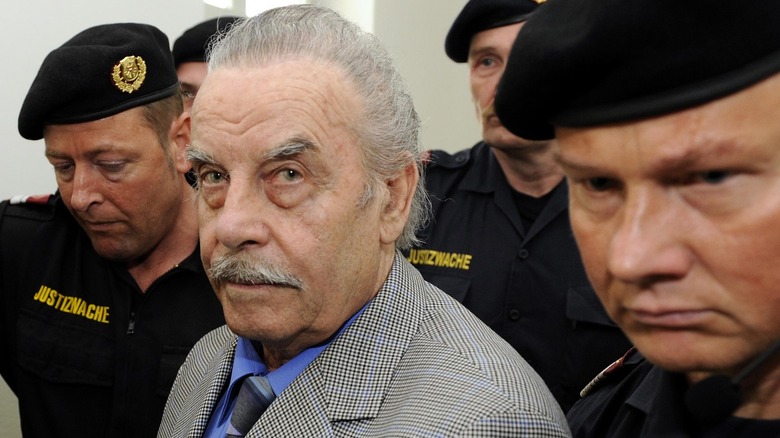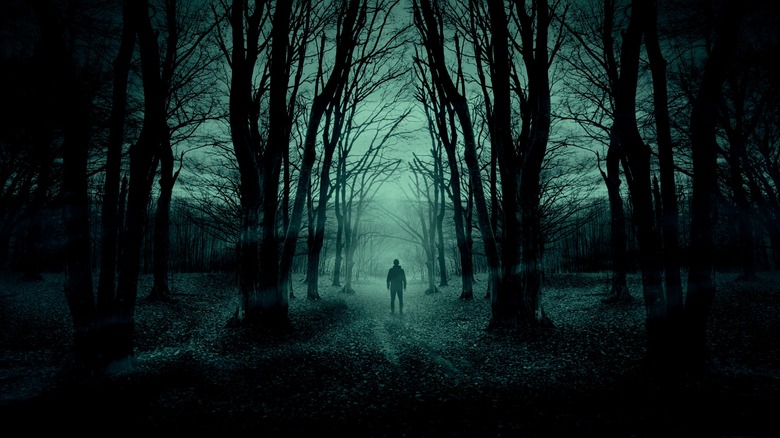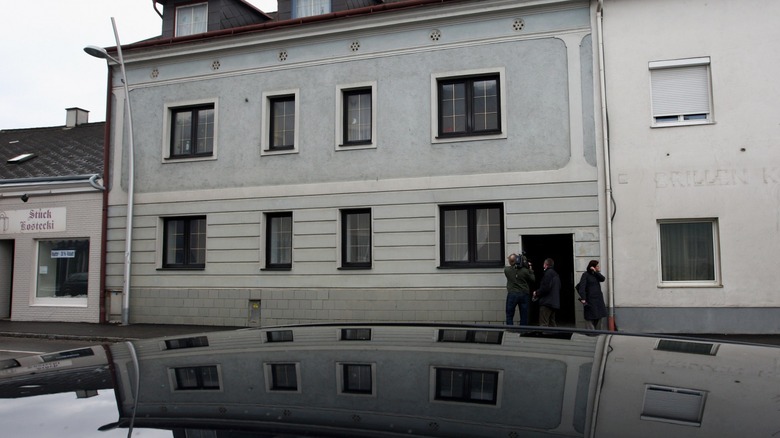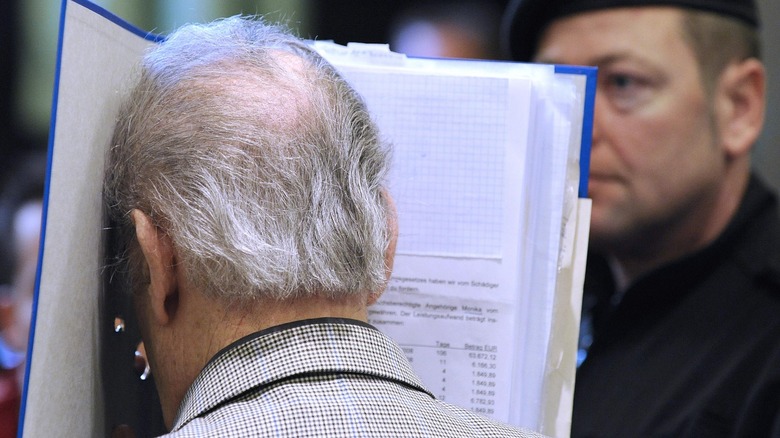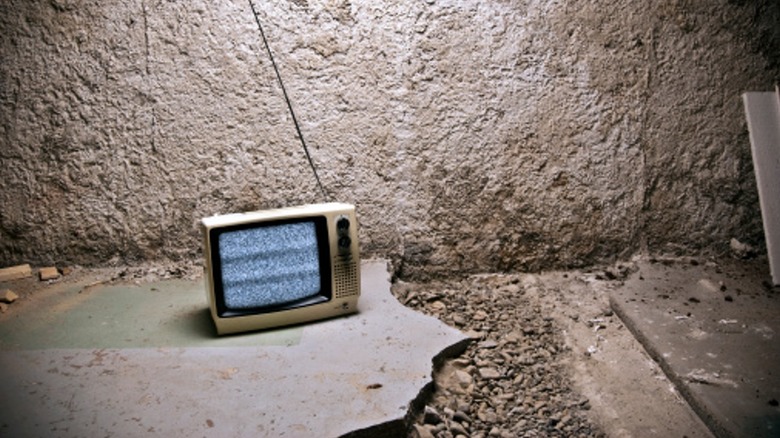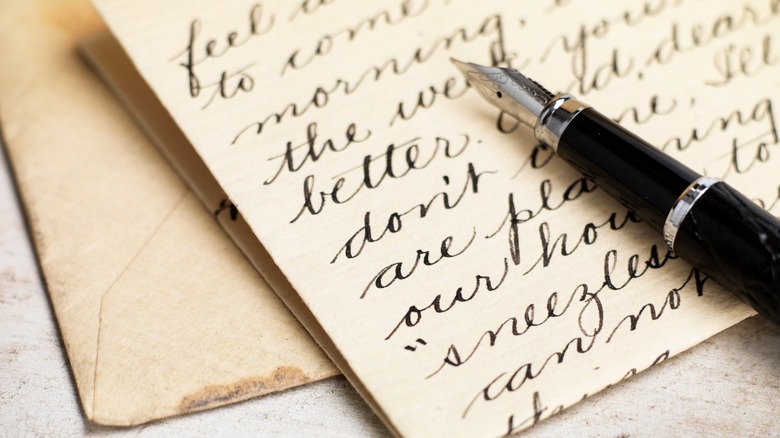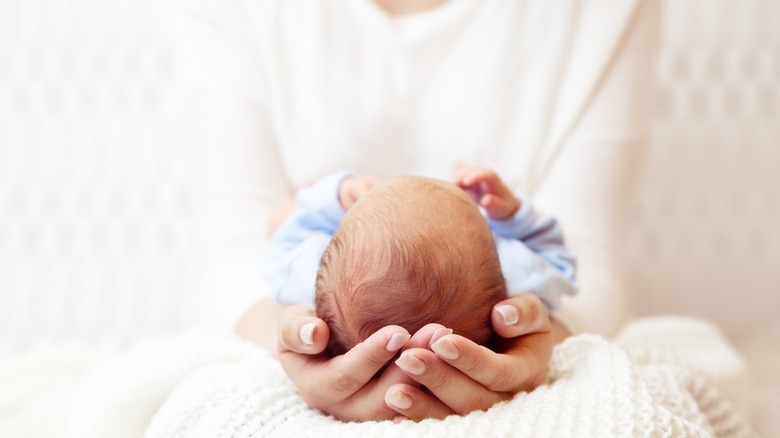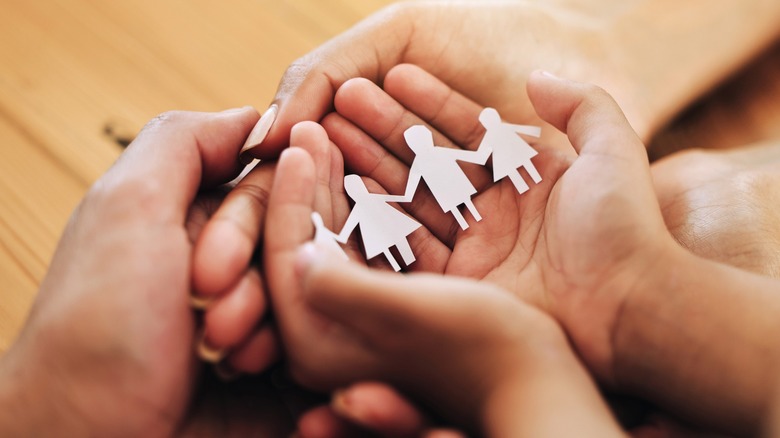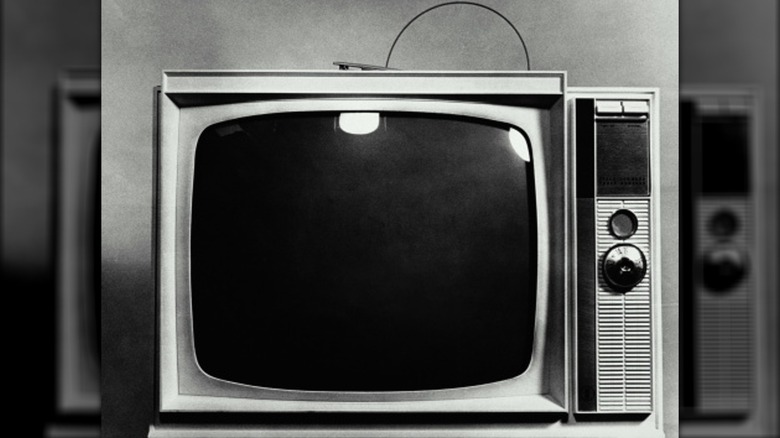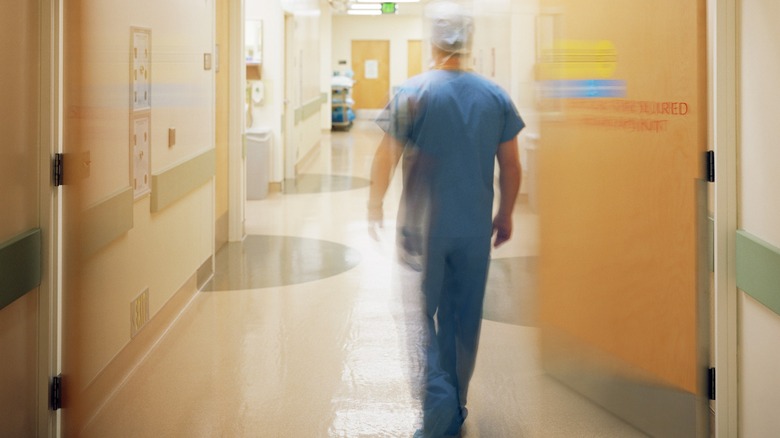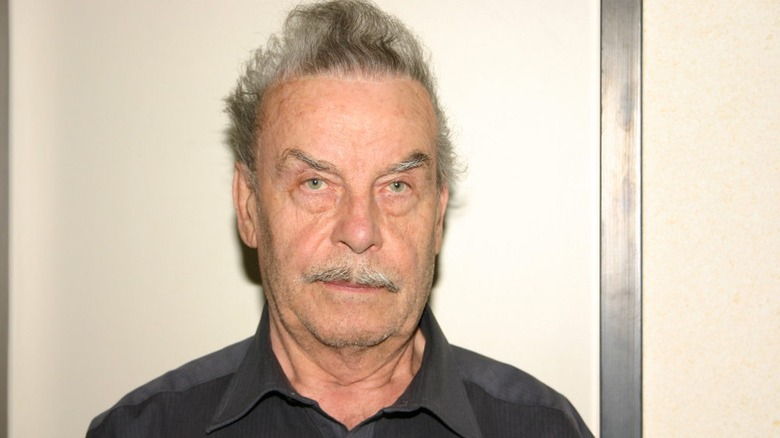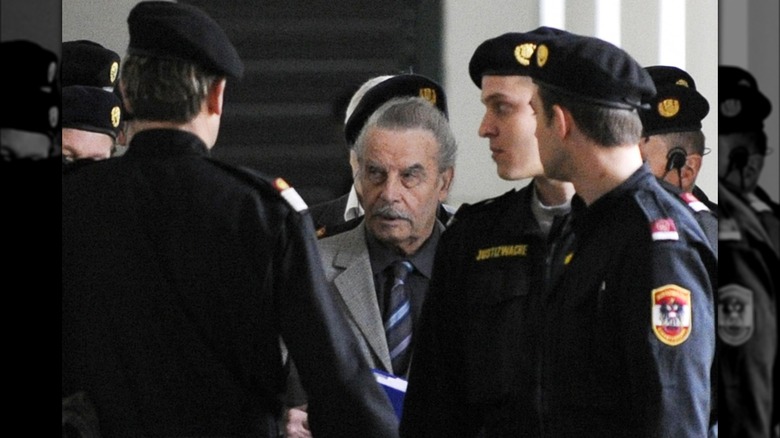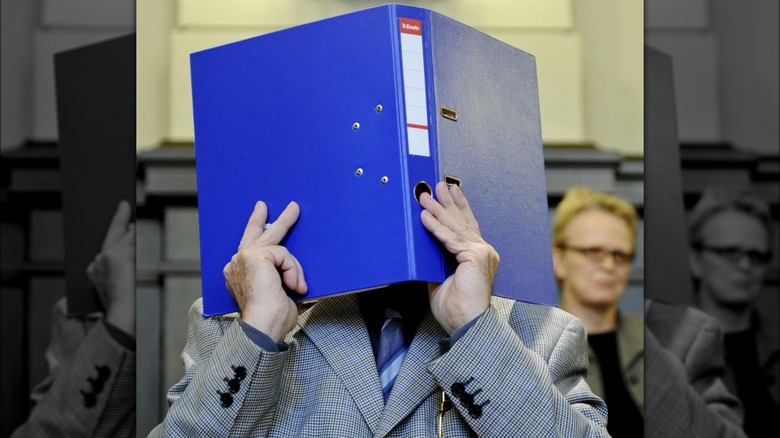The Harrowing True Story Of The Fritzl Family
On Friday, April 25, 2008, 42-year-old Elisabeth Fritzl stepped foot into the world outside her home for the first time in almost 24 years, and the next day, made her way to the local hospital with her father, Josef Fritzl, to visit her seriously ill daughter Kerstin. With her 19-year-old daughter's life hanging in the balance, the woman was promptly arrested on suspicion of child abuse and endangerment by Austrian police. However, what already seemed like a strange tale was about to get even stranger, and a whole lot darker.
On August 28, 1984, Elisabeth's life had changed forever, but not in a good way. That day, her father Josef had kidnapped her and locked her into an underground dungeon he'd built. Elisabeth would stay trapped, enduring horrifying amounts of abuse at the hands of her father, until that April night when he finally allowed her to come upstairs and out of her forced captivity. To explain her disappearance, police were led to believe that she had been living with a religious cult and did not want to be contacted, and even her own mother did not know the truth about her captivity.
It was not until after Elisabeth had been arrested and questioned that authorities finally learned the horrible truth about her abuse and confinement since August 1984. This is the harrowing true story of the Fritzl family.
The following article includes allegations of child abuse, domestic abuse and sexual assault.
Josef Fritzl was a convicted rapist
Well before Josef Fritzl began the torture of his daughter Elisabeth Fritzl, he had already likely abused several women, including one that resulted in a conviction and prison sentence. In 1967, Josef was a suspect in a case where a man attempted to assault a woman after dragging her into the woods, but she was able to escape, and he was not charged. Another woman also claims that in the late-1960s, Josef broke into her house and raped her at knifepoint, though she did not file a police report.
In October 1967, a month after the attempted assault in the woods, Josef broke into another woman's house and attacked her, but this time the victim reported the rape to police and Josef was quickly arrested. However, the judge considered Josef to be a relatively upstanding citizen, took into account his wife and four children — Elisabeth was born the year prior in 1966 — and only gave him a year and a half in prison. Josef was 32 years old at the time, and it was a very lenient punishment considering the violent and appalling circumstances.
Nonetheless, even though he had been convicted and ended up serving almost a year in prison, his wife, Rosemarie Fritzl, still stood by him. She apparently believed, or wanted to believe, that Josef was innocent and was wrongly convicted. Eventually, the conviction would disappear from Josef's record, but in hindsight, it was a clear foreshadowing of what was to come.
Josef began abusing Elisabeth at a young age
Though Josef Fritzl would not entrap his daughter until August 1984, when she was 18 years old, the abuse started far earlier. When she was a young girl, family friends would notice that Elisabeth was visibly further withdrawn emotionally compared to the other children, and that Josef seemed to be more physically abusive towards her than he was with his other children.
Elisabeth's friends at school knew that her father beat her, and she would try to hide the marks from the violence from her teachers. Elisabeth's friends were all terrified of Josef, and she would purposefully limit the amount of contact they had with him out of fear. The sexual abuse and rape may have begun when Elisabeth was as young as 11 years old, possibly when the rest of the family went on a vacation to Europe — which Josef and Elisabeth stayed home for.
After enduring years of her father's malevolent behavior, as a teenager, Elisabeth tried to run away multiple times. Yet, every time she ran away Josef would be there to take her back, no matter how unwilling she was. As her mental state deteriorated, she may have even started to contemplate dying by suicide. Still, Elisabeth somehow managed to carry on, well aware of the underground shelter her father was building, but with no idea what it would ultimately turn into.
Josef lured Elisabeth to his cellar
Josef Fritzl began building the underground cellar he would use to imprison his daughter in 1978, and at first it was probably supposed to be a nuclear fallout shelter. This was the height of the Cold War, and the fear of being struck by nuclear weapons was very real for everyone. Josef even got state subsidies for doing what was seen as a relatively noble thing. Yet, just as the shelter was nearing completion, Josef decided to add two more rooms to the seven-room design, but without the city's knowledge (who had already approved the unit).
Obviously, no one knew the fallout shelter would eventually become a torture chamber. As it turns out, not even Josef himself did. It was not until May 1984, just a few months before the kidnapping, that Josef decided that he was going to use the secret rooms to keep his daughter captive, and it was going to be temporary. Elisabeth had turned 18 years old the month prior, and Josef was worried about her moving away forever, something that he found out for certain two days before he kidnapped her.
On August 28, 1984, Josef lured Elisabeth down to the cellar, which had always been off-limits, ostensibly to talk to her. However, as soon as she got down, he immediately snuck up from behind and held a chloroform-soaked rag over her face, quickly knocking her unconscious. The next time she woke up, she would be a prisoner.
Elisabeth's life was absolutely horrific
To say that Elisabeth Fritzl faced horrific and heinous living conditions does not even begin to chip the surface of the pain she endured. After locking her in the cellar, her father, Josef Fritzl, initially handcuffed her to a pole, and then he put a dog leash on her to restrict her movement. The cellar was soundproof, so no matter how much noise she made or how loud she screamed, she was completely cut off from everything once she was inside. The only things Josef would provide for her for any sort of comfort at first were a TV, radio, and a small heater.
For at least the first month of imprisonment, Josef severely and repeatedly hit Elisabeth, and he also continued sexually abusing her, too, the latter of which never stopped. Almost daily, Elisabeth was enduring abuse, and she also started to become ill due to the living conditions of the cellar. The air circulation was inadequate to filter out all the carbon dioxide, resulting in her developing breathing problems.
Mentally, Elisabeth began to fall into a dissociative state and depression, and physically, her lack of vitamin intake was starting to break down her body. Her father would withhold food from her if she tried to resist his advances, and she did not even have control of the light switch. In short, it was hell.
Elisabeth had to cover up her own disappearance
When Elisabeth Fritzl first went missing in August 1984, her family all seemed to be incredibly worried. Josef Fritzl went around practically in tears, informing his neighbors about her vanishment. Elisabeth's mother, Rosemarie Fritzl, was beside herself with worry, as were her several siblings, who were likewise shocked by the news. Rosemarie reported her daughter missing to the local police the next day, but due to Elisabeth's age — she was 18 and legally an adult — the police did not appear overly enthusiastic about trying to find her.
A month later, a letter came in the mail, supposedly from Elisabeth and postmarked from the nearby town of Braunau am Inn. The letter was extraordinarily vague, but stated that she was moving away for her independence and did not want her parents to look for her. The handwriting was authentically Elisabeth's, but the words were not. Josef made Elisabeth write the letter so that he could throw off any suspicions and make everyone think she was living with a religious cult, something he had already alluded to as a possibility for her disappearance.
Elisabeth had to continue writing letters, mainly to her mother, in order to keep up the ruse, and unfortunately they worked just as Josef intended. Her mother, siblings, and police were all convinced that she was a runaway, and when she turned 19, the police officially stopped looking for her. Elisabeth was completely trapped.
Josef fathered seven children with Elisabeth
One of the most disturbing aspects of the entire Fritzl family story is that Josef Fritzl fathered seven children with Elisabeth Fritzl during the 24 years he kept her locked away. Elisabeth first became pregnant by rape in September 1986, around two years after she was kidnapped, but she had a miscarriage. After becoming pregnant again, on August 30, 1988, she gave birth to her first daughter, Kerstin Fritzl, without any assistance from Josef, who deliberately did not show up (via Stefanie Marsh in "I'm No Monster").
A year and a half after giving birth to Kerstin, Elisabeth had her second child, Stefan Fritzl, in February 1990. Between their births, the world outside was experiencing monumental change, like when the Berlin Wall fell in November 1989, but Elisabeth was completely in the dark, both literally and figuratively. Her third child came in August 1992, and Elisabeth named her Lisa Fritzl. With Lisa, that meant four people were living inside the cellar, so Josef forced them with bare hands to dig a tunnel that connected the secret two-room shelter with the original nuclear fallout shelter.
In February 1994, her fourth child, Monika Fritzl, was born, and she gave birth to twins in April 1996. They were brothers, Michael and Alexander Fritzl, but Michael became ill and died, with Josef incinerating his body shortly after. Felix Fritzl was born in December 2003, and DNA tests would later prove that Josef was indeed the father to all of them.
Elisabeth's parents brought up some of her children
Of the seven children that Josef Fritzl forced his daughter Elisabeth Fritzl to have, three came to live upstairs outside of the cellar. The first to come up was Lisa Fritzl in May 1993 when she was less than a year old. It was extremely bittersweet for Elisabeth, who knew that growing up above-ground, even in a household run by her abusive father, was still better for Lisa than growing up underground.
It likely saved Lisa's life as well as her sister Monika Fritzl, who was taken up in December 1994. Both of them had medical issues, and had they stayed underground, they would not have received proper treatment. The third child to come up was Alexander Fritzl, the surviving of the two twins, in August 1997. To improbably explain the sudden appearance of three infant children literally on his doorstep, Josef forced Elisabeth to do the same thing he did to cover up her disappearance: He made her write letters explaining that the children were hers and she was giving them up to her former family, which the authorities believed.
Josef and Rosemarie Fritzl adopted Lisa in May 1994 but became the foster parents to both Monika and Alexander, as it entitled them to more state subsidies. Though he was a convicted rapist, Josef's criminal record of rape had been erased in the 1970s due to Austria's laws, and the authorities thought him fit to raise the newly arrived children.
The underground children had miserable lives
While three of Elisabeth Fritzl's children were able to grow up in what appeared to be the relative normalcy of Josef and Rosemarie Fritzl's household, the other four siblings had to endure the depravity of living underground. One of the biggest issues that the children faced was the lack of sunlight, which stunted growth. Josef gave them vitamin D tablets and changed the lights to ultra-violet bulbs, but that was only a poor substitute at best.
If the children found themselves sick or ill, they were never allowed to see a doctor or any kind of medical expert, and Elisabeth herself did not have any medical training. Instead, Josef would give them aspirin, which only helps reduce pain and fever, but doesn't actually do anything to ward off or fight against infections and disease.
In addition to the physical horrors they faced, the children also endured incredible psychological distress. For almost the entire first decade that they were underground, there were only two rooms. This meant that the earliest-born Stefan and Kerstin had to constantly watch Josef's sexual and physical abuse of Elisabeth, which did not change until after Josef forced them to enlarge the cellar themselves in 1993.
The underground children were well aware of life outside the cellar, as Elisabeth made sure that they knew. They had access to a TV, which showed them what the world was like, even though they could not experience it themselves, which must have been devastating.
Josef planned to reunite the families
By the fall of 2007, it appeared as though Josef Fritzl was finally ready to end his imprisonment of his daughter Elisabeth Fritzl and their underground incestuous children. By that point, Elisabeth had been locked away for 23 years since August 1984, and had spent more time underground than she had above ground. Improbably, Josef seemed to believe that he could just reintegrate Elisabeth back into the regular family, acting as if nothing had happened.
He started laying the groundwork in late 2007, when he began clearing space for her to move back in. He also had Elisabeth write another contrived letter claiming she was planning on coming home with even more children. However, in April 2008, the timeline moved up from the end of the year when 19-year-old Kerstin Fritzl became seriously ill and needed to be hospitalized.
Just like before, when he needed to introduce one of his and Elisabeth's children to the world, Josef pretended that Kerstin had been dropped off on his doorstep again with another letter from Elisabeth explaining she was the mother. However, this time things were much different. This wasn't a baby but a full-grown adult, and her appearance raised too many questions. Believing that Kerstin's condition was a result of child abuse, after Josef took her to the hospital, Austrian police issued a warrant for Elisabeth's arrest, but they would soon realize they had the wrong suspect.
Elisabeth asked police to protect her from Josef
The first time that Elisabeth Fritzl was allowed to leave her underground prison was on Saturday, April 19, 2008. She was only upstairs for a very brief period to help her father, Josef Fritz, carry up their daughter, Kerstin Fritzl, before she was taken to the hospital. A few hours later, Kerstin and Josef were at the hospital getting her treatment, while Elisabeth was back downstairs with her two remaining children, Stefan and Felix.
At first, the authorities seemed not to question Josef's outlandish tale about Kerstin's amazing appearance on his doorstep. However, pretty soon they were beginning to doubt the entire story about her running away to a cult, much less Kerstin's sudden emergence. Still, with nothing to go on, the authorities assumed that Elisabeth was responsible for Kerstin's condition. So when Elisabeth miraculously turned up and came to the hospital, they quickly arrested her on suspicion of child abuse. When they interrogated her, Elisabeth — under threat of death from her father — tried to maintain the fiction about the cult.
Yet, things fell apart as soon as the police mentioned taking her children away. Elisabeth pleaded with detectives to promise to protect her and her family from Josef if she agreed to talk, and then she told them the horrible truth. Immediately, the police arrested Josef and put him behind bars, and the nightmare was finally beginning to end.
Rosemarie Fritzl was apparently unaware
As improbable and unlikely as it may seem, neither Rosemarie Fritzl nor any other member of the Fritzl family who lived upstairs — outside of Josef Fritzl — had any idea about the captivity of Elisabeth Fritzl and her children. Josef was apparently able to keep Rosemarie in the dark about building the spare cellar that would house Elisabeth by constructing it when she was away, and even if she was suspicious, she does not appear to have ever openly questioned anything.
Also, the fact that Josef constantly hid his movements from Rosemarie when bringing Kerstin Fritzl to the hospital points to her having no idea. Family friends have reported that Josef was very physically abusive to Rosemarie during their marriage, and that she was afraid that he would either kill her or take the children away if she divorced him or left him, which may have led her to suppress any suspicions.
While Rosemarie stayed with Josef following his rape conviction in 1967, the 2008 revelations were far too disturbing to ignore. She filed for divorce and began to regularly see her daughter Elisabeth for the first time in decades. It was probably not the reunion she had hoped for, but it was at least better than the alternative of never knowing the truth, no matter how painful it was.
Josef was given a chance a parole
To say that the world was stunned to find out about the revelations surrounding Josef Fritzl and the Fritzl family is, at the very least, an understatement. News about the discovery immediately splashed across newspapers like The New York Times, and it raised troubling similarities with the disappearance of Natascha Kampusch, another Austrian girl who was imprisoned for several years but who had escaped in 2006.
Though his wife Rosemarie Fritzl did not help prosecutors by testifying, Josef would eventually plead guilty to a number of charges, which included rape, incest, and false imprisonment. He was also convicted of the murder of one of the children, Michael Fritzl, who died when he was an infant after not receiving medical care, and whose body Josef burned in an incinerator shortly after. After the trial, at the age of 73, a judge gave Josef a life sentence in Austrian prison. However, due to Austrian law, Josef could potentially be released after just 15 years in prison on parole, even if it's extremely unlikely.
As of May 2023, Josef was still serving his life sentence in a psychiatric prison facility, and had the audacity to write a book about his memoirs, with the help of his lawyer. Elisabeth and her children have stayed out of the public eye after going through psychiatric care, hoping to preserve a measure of privacy.
If you or anyone you know needs help with addiction issues, may be the victim of child abuse, or has experienced a hate crime, contact the relevant resources below:
-
The Childhelp National Child Abuse Hotline at 1-800-4-A-Child (1-800-422-4453) or contact their live chat services.
-
The National Domestic Violence Hotline at 1−800−799−7233. You can also find more information, resources, and support at their website.
-
The Rape, Abuse & Incest National Network website or contact RAINN's National Helpline at 1-800-656-HOPE (4673).
